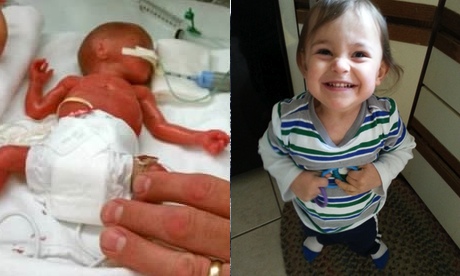
On the day my twins were born, they racked up medical bills of $29,000 apiece.
They were delivered via emergency caesarean section at 24 weeks' gestation, meaning I was roughly five months along. Our daughter, Jaina, weighed just under a pound; her brother, Cade, weighed 1 pound, 5 ounces.
They couldn't breathe on their own. Their skin was so thin, their bodies so small, we could watch their hearts beat. They hadn't developed cartilage yet; their ears and noses were flaps of skin. We didn't ask how much it was going to cost to treat them; we just wanted our babies to live.
Our many doctors talked about day-to-day survival, not long-term payment plans.
My employer – a newspaper not far past a round of buyouts and cost-cuts – didn't ask me how much it was going to cost to treat them. My co-workers pooled money and bought us gift cards so we didn't have to cook as we drove back and forth to the hospital for months.
When I read AOL chief Tim Armstrong's comments blaming his company's increased health-care costs on two "distressed" babies with million-dollar medical bills, I wondered if that's what everyone thought about our twins. Did we spend too much of someone else's money to try to save them?
I know my unplanned first pregnancy (at 41) cost a whole lot of money, much of which didn't come out of my pocket. Insurance and Medicaid picked up all but a few thousand dollars of the $2m we "spent" at the Harrisburg Hospital neonatal intensive care unit in four months.
Our Jaina lived only 49 hours. In that time, she had x-rays, blood transfusions, IVs, a ventilator, an incubator, a dedicated nurse. I don't even know what else. All I know is she was very sick and she died, and I would've paid $10m – any amount – to save her if I could have.
Cade seemed healthier at first, but had his first (of 10) surgeries when he was two weeks old. When he was three weeks old, struggling through his umpteenth infection, a doctor asked us if we wanted keep trying to keep him alive.
We did, no matter the cost.
Thanks to talented doctors and nurses who found the source of the infection and fixed it, Cade turned the corner after that day. He wasn't out of the woods, though. He couldn't breathe on his own until he was two months old. He had sight-saving eye surgery at three months.
At one point, we were told he likely had cerebral palsy and would be disabled in some way, maybe mentally, maybe physically, maybe both. Was a disabled child too expensive to keep? No one asked that question. My husband and I never considered it.
Cade was released from the NICU when he was four months old. His first week home, he had seven doctor appointments. He didn't have cerebral palsy after all, but got government-paid early intervention services to help him learn to walk and talk and catch up with his non-preemie peers.
Today, Cade is a happy, healthy two-year-old. He has mild asthma, but hasn't been hospitalized unexpectedly for more than 18 months, which is cause for celebration. He still sees a lot of doctors, but not very often. His last surgery was only a month ago, but his scars on his back, his belly and his arm don't seem to bother him. Mostly, he giggles and skips and asks to watch "Hi Elmo" (Sesame Street) all the time.
I wonder if AOL's Tim Armstrong, who has apologized for his statements, understands how dehumanizing they were. Some have even suggested his comments violated America's healthcare privacy laws. Remember when Obamacare opponents were talking about grandma being subjected to death panels instead of expensive care? It's the same thing. It's as if he wanted cost-benefit analyses to be done before our daughter's IV was put in or our son's cardiac surgeon called.
Thankfully, in our case, my husband and I were able to decide what was best for our child without worrying about the cost. We've always paid our insurance premiums and taxes without complaint, believing that the common good is worth sharing the pain. We've tried to give back what we've been given through work and volunteerism.
Should I feel guilty for having medically fragile babies? Was it worth it? Was it fair for others to help pay for them? Should my son feel pressured to have a better-than-average life because his start cost a lot more than everyone else's?
Unanswerable questions. I can't put a price on a priceless life, and neither can anyone else.

